
Value Steel crossborder event was organized online 23.3 as a part of DigiProcess Interreg Nord project. The event attracted over 60 participants from industry, SMEs, and other actors from Finland and Sweden to hear and discuss about steel industry´s digital future.
This news story focuses on the keynote talk, given by Peter Wallin - Program Director of Process Industrial IT and Automation (PiiA) project. A news story about Value Steel industry talks and SME presentations will be published later this week.

Keynote: Digitalisation in the Swedish process industry – Trends, Challenges, and Actions
In his keynote, Peter focused on telling more about PiiA, current trends of industry digitalization in Sweden, and things that SMEs should take into account to improve digitalization co-operation with the industry.
What is PiiA?
PiiA is Sweden’s national strategic innovation program which offers support for companies in areas of innovation projects, research, networks, and industry insight reports to help the Swedish process industry develop advanced IT and automation solutions. PiiA acts in seven market areas which are: production of pharmaceuticals, metal industry, chemistry and petroleum, mining and minerals, power production, production of food and forestry.
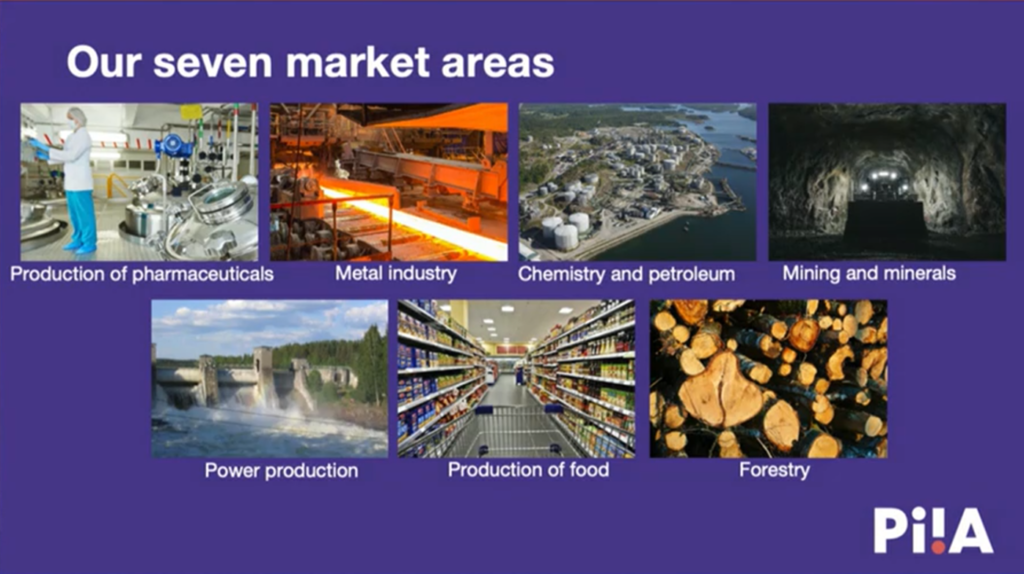
Current trends of Sweden industry digitalization
According to Peter, the real industrial revolution is ongoing and the transformation of digital business ecosystems is accelerating. Cloud-based services are still dominating industry digitalization activities but soon data-driven solutions will become more popular and essential for business model success. Increased data reserves are not the key to success, the key is to learn to use this data in more clever and efficient way.
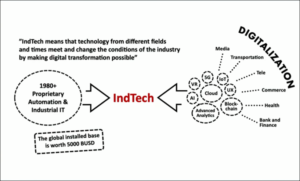
Peter´s view on how digitalization and existing industry capabilities join together making digital transformation possible
Peter emphasized that traditional views of industrial automation have been
pyramid-shaped hierarchies (like Automation Pyramid, Figure 1). In this view, operational technology (OT) is closest to production and IT for business processes located above it. The dissolution of such structures in the interest of more flexible arrangements has long been the subject of discussion. In the short term, the focus of industrial automation may be on removing silos through practical integration between computers and organizations, as well as between companies in the supply chains. In the long term, true interoperability f the industrial automation is very likely, with full interchangeability of information without manual intervention, based on accepted industry standards.
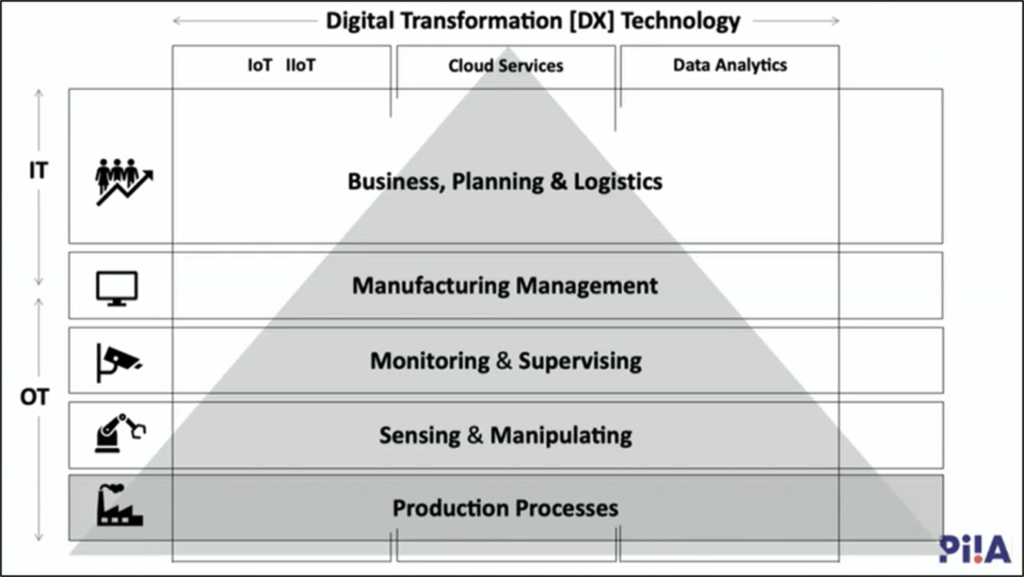
Automation Pyramid - a traditional siloed view of industry digital transformation
Sweden´s industry is making big investments to digitalization by a year level (around 150 b$/year). One of the biggest trends in Sweden´s industry digitalization is the increased need and use of AI solutions. Peter highlighted from PiiA´s "Effect of AI" report (link), that AI solutions can provide a big productive boost (1,2%) compare with other technology steps.
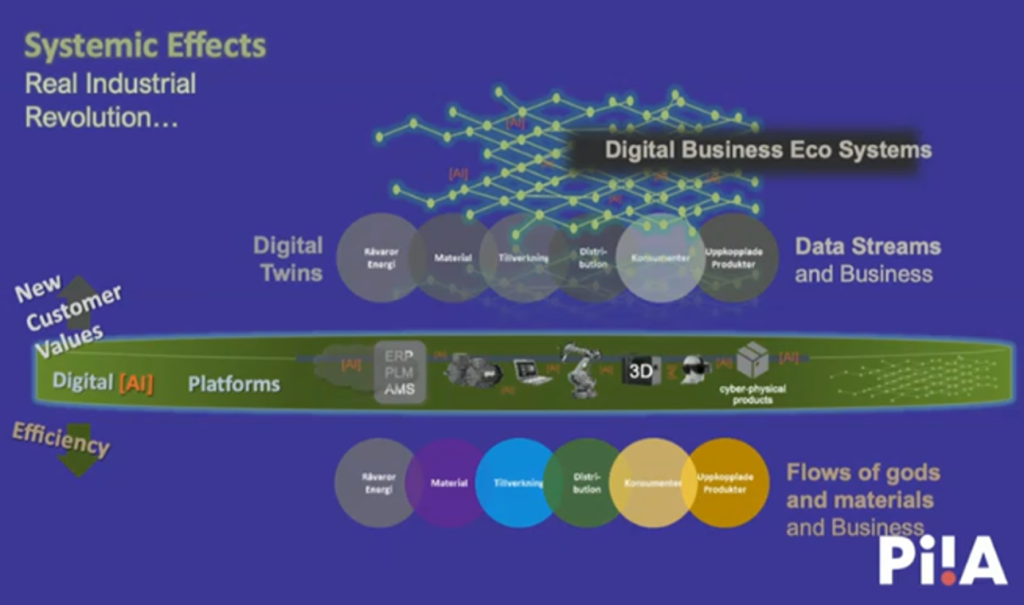
Role of the Artificial Inteligence in digital industrial revolution
Peter emphasized that business leadership and management of how to do business in the digital environment has to change. Industry digitalization ecosystems and platforms are becoming more complex containing actors from many fields who have to be able to interact together to provide digital solutions for industry needs. Hence, business leaders must leave a conform zone and seek new opportunities with open mind to make investments. As Peter said: ”In order support in the smart industry goals, a used technology has to work smoothly”.
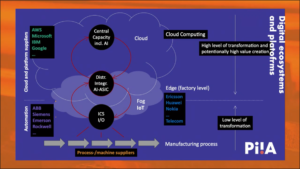
Visualization of today´s complex industry digitalization ecosystem. Actors of this ecosystem have to co-operate efficiently to provide digital solutions for industry needs
What SMEs should take into account to improve digitalization co-operation with the industry?
As Peter stated, “big companies are not able to do everything by themselves”. New digitalization trends, ecosystems, and investment create new business opportunities for SMEs. Peter emphasized that to succeed, SMEs have to act proactively towards the industry. In mids of this changing digitalization environment, SMEs can thrive by focusing on and offering technologies that are new to the industry.
SMEs are more than needed for the transformation of industry digitization. Peter highlighted that SMEs have capabilities to evolve and change industry business models in unique ways that industry couldn´t otherwise achieve. In short, the industry needs innovative SMEs to thrive in the digital era. When asked what can be done to develop digitalization in ecosystems (and industry SME collaboration), Peter notes that we have to build environments, testbeds and test areas, which enable demonstrations of digital solutions and which are easy to access and use.
Finally, Peter emphasized that SMEs should think carefully, what type of data they must have and what type of data they don´t necessarily need from the industry ecosystem. Data security is a big challenge for industry digitalization ecosystems and SMEs which can thrive with reasonably sized datasets will have an advantage. As Peter closed: "The right way to forward is through small steps”.
This summed up Peter’s excellent keynote. To learn more about PiiA-project, please visit PiiA homepages.
Main contact and inquiries:
Peetu Virkkala, DigiProcess Project Researcher, University of Oulu, +358 45 644 3202, peetu.virkkala@oulu.fi
Jani Sipola, DigiProcess Project Manager, Lapland University of Applied Science, +358 50 316 7677, jani.sipola@lapinamk.fi





